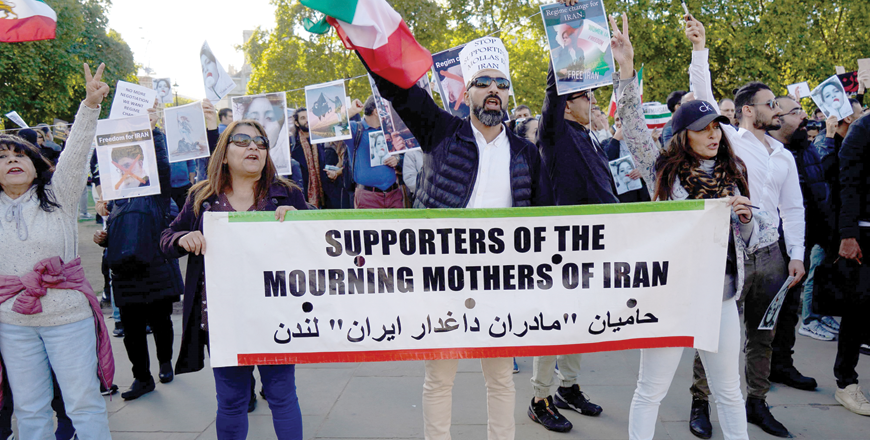You are here
Iranians protest on anniversary of lethal 2019 crackdown
By AFP - Nov 16,2022 - Last updated at Nov 16,2022
PARIS — Iranians took to the streets Tuesday after organisers of protests over Mahsa Amini's death called for demonstrations marking three years since a lethal crackdown on unrest sparked by a fuel price hike.
The call to commemorate those slain in the 2019 crackdown is expected to give new momentum to the protests that have roiled Iran for two months since Amini died on September 16 after her arrest for allegedly flouting the Islamic republic's strict dress code for women.
Young activists have appealed for people to "conquer" the streets in Ahvaz, Isfahan, Mashhad and Tabriz, among other cities including Tehran.
Shops were shuttered in Tehran's famed Grand Bazaar and its neighbourhood of Tehranpars, and women were seen waving their headscarves above their heads on the street in the southern city of Shiraz, according to online videos verified by AFP.
"Death to the dictator," commuters were heard chanting in a Tehran metro station, using a slogan directed at Iran's supreme leader Ayatollah Ali Khamenei, in other footage shared online.
Striking steel workers were seen gathering in a car park in the historic city of Isfahan, in videos posted on social media. AFP was unable to immediately verify the images.
Workers downed tools and university students boycotted classes in Amini’s home province of Kurdistan, in western Iran, said the Oslo-based Hengaw human rights group.
In the province’s flashpoint city of Sanandaj, protesters were seen burning tyres in a street and chanting anti-government slogans, in other online footage.
“Woman, life, freedom” and “Man, homeland, prosperity”, chanted young male and females students at Islamic Azad University in the northwestern city of Tabriz, in a video published by the 1500tasvir social media channel.
Bloody November
The call for protest actions on Tuesday is to mark the third anniversary of the start of “Bloody Aban”, or Bloody November, when a surprise fuel price hike sparked bloody street violence.
The days of unrest in Iran from November 15 saw police stations attacked, shops looted and banks and petrol stations torched as authorities imposed a week-long internet blackout.
Amnesty International said at least 304 people were killed in the unrest that quickly spread to more than 100 urban centres across the Islamic republic.
A tribunal convened in London this year by various human rights groups said expert evidence suggested the actual number killed was likely far more, and possibly even as high as 1,515.
The anonymous youth groups behind the latest calls for protests have been mobilising since the death of Amini, a 22-year-old Iranian woman of Kurdish origin.
Oslo-based group Iran Human Rights said on Saturday that security forces had killed at least 326 people so far in the ongoing crackdown on the Amini protests.
The unrest was fanned by fury over the dress rules for women, but has grown into a broad movement against the theocracy that has ruled Iran since the 1979 Islamic revolution.
They have shown no sign of abating despite the Iranian authorities’ use of lethal force to confront what human rights groups say have been largely peaceful protests and a campaign of mass arrests that has snared activists, journalists and lawyers.
‘Eyes of the world
on Iran’
Among them is prominent freedom of speech campaigner Hossein Ronaghi who, according to Iran’s judiciary, has been taken back to prison after being hospitalised.
Fears had been raised over the health of the 37-year-old Ronaghi, who launched a hunger strike after his incarceration in Tehran’s notorious Evin prison on September 24.
The European Union and Britain on Monday slapped sanctions on more than 30 senior Iranian officials and organisations over the crackdown.
The EU sanctions targeted Interior Minister Ahmad Vahidi and the head of Iran’s ground forces Kiyumars Heidari among those it said were responsible for the repression of demonstrations.
Four members of the squad who detained Amini were also put on the blacklist.
Among the organisations hit was state broadcaster Press TV, which was accused of airing “forced confessions of detainees”.
The United States strongly praised the European actions and declared: “The eyes of the world are on Iran.”
The US government also condemned Iran’s cross-border drone and missile strikes on Monday against Iraq-based Kurdish opposition groups that the Islamic republic accuses of stoking what it calls the “riots” at home.
Iran, which has accused the US and its allies of fomenting the unrest, threatened to retaliate.
“With their dependence on sanctions, the Europeans lose all rationality and seriousness,” Foreign Ministry spokesperson Nasser Kanani said.
“Iran will respond effectively and forcefully to Europe’s unconstructive actions,” he added.
Related Articles
PARIS — Schoolgirls chanted slogans, workers went on strike and protesters clashed violently with security forces across Iran on Saturday, a
PARIS — Iranian security forces fired tear gas Wednesday at a lawyers' protest over Mahsa Amini's death, said a rights group, which also rai
PARIS — The official death toll from Iran's wave of popular unrest shot up on Thursday to at least 17 as popular anger has flared over the d












